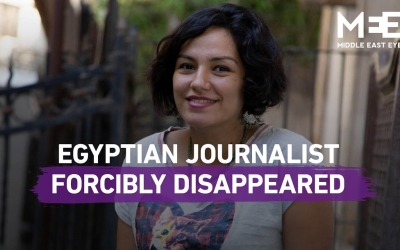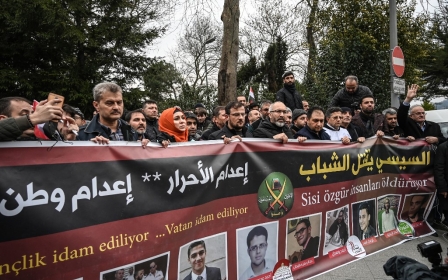Egypt releases journalist Basma Mostafa following outcry

Egypt’s public prosecutor ordered on Monday the release of journalist Basma Mostafa, whose disappearance and arrest sparked an outcry by press freedom advocates over the weekend.
"The prosecutor-general has ordered the release of the defendant Basma Mostafa after she was questioned on the charges laid against her," the prosecution said in a statement overnight Monday, adding that the investigation would continue.
Prosecutors had accused Mostafa of "using her personal social media account to publish and promote false news", the statement said.
The journalist had been forcibly disappeared on Saturday before appearing in front of the State Security Prosecution in Cairo on Sunday morning, according to her lawyer and husband Karim Abdelradi.
Abdelradi said that Mostafa disappeared near the Luxor train station and that she was able to receive phone calls and messages, though she did not pick up any calls.
Prior to her arrest, Mostafa was sent to Luxor by independent news website Al-Manassa to cover growing unrest in the area after the alleged police killing of a man following anti-government protests in the city.
Clashes between residents and security forces intensified in the upper Nile region following the killing of resident Awais al-Rawi, who was shot dead by a police officer in front of his home on Wednesday.
Awad al-Rawi, one of Awais's cousins, told Middle East Eye that on the night in question, security forces stormed into the family house in al-Awamiya, some 30 minutes from the ancient Luxor ruins, to arrest a family member suspected of having taken part in small-scale nationwide protests last week.
'Retaliation for covering news'
A seasoned journalist, Mostafa has covered several high-profile stories for Al-Manassa over the past two months.
These include the aftermath of the death of 26-year-old Islam al-Australy in police custody and the public prosecution's backlash against the victim and witnesses to the 2014 Fairmont hotel gang rape case. Mostafa revealed how at least two of the six arrested were subjected to forced anal and vaginal examinations.
Forcible disappearances are common in Egypt, with a number of activists, journalists or individuals seen as critical of the government of President Abdel Fattah el-Sisi having gone missing over the years, only to later appear in court.
New York-based press freedom watchdog the Committee to Protect Journalists (CPJ) on Monday condemned her arrest as a "clear retaliation for covering news that the Egyptian government wants to suppress".
Additionally, the International Press Institute (IPI) in Vienna called her detention "outrageous" and accused the international community of turning "a blind eye to the gross press freedom and human rights violations in Egypt".
The IPI described Abdelradi as a "human rights lawyer... who represents several detained journalists and human rights defenders in Egypt".
Middle East Eye delivers independent and unrivalled coverage and analysis of the Middle East, North Africa and beyond. To learn more about republishing this content and the associated fees, please fill out this form. More about MEE can be found here.






